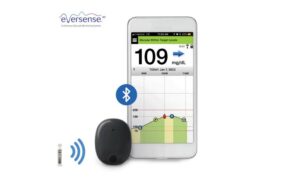
Germantown, Maryland-based Senseonics presented two studies on its latest-generation Eversense E3 at the American Diabetes Association 83rd Scientific Session. The 180-day implantable CGM received FDA approval in February of last year. The sensor is fully implantable and requires just two sensor insertion and removal procedures per year.
Senseonics’ latest data includes evidence supporting even longer wear time, plus more positive results for the existing platform.
“These data further bolster Eversense’s position as a leading CGM choice for people with diabetes,” said Dr. Francine Kaufman, Senseonics chief medical officer. “These recent studies are an important step forward as we continue to expand awareness of the system’s unique clinical benefits.
“We are thankful for the opportunity to present these results to our peers at the American Diabetes Association Scientific Sessions and are proud to support the global diabetes community with a CGM that provides safety and accuracy benefits that can lead to more effective diabetes management.”
Accuracy evaluation of the Senseonics CGM over 365 days
This feasibility study evaluated 32 patients using a modified Eversense CGM system. It assessed if longevity could extend through 365 days while maintaining accuracy.
Key findings included that the sensor longevity registered at 97% through one year. It proved safe with a few minor skin irritation adverse events. Mean absolute relative difference (MARD), an accuracy measurement for CGMs, came in similar to the 180-day E3.
“The feasibility study of the next-generation Eversense sensor showed the system could provide accurate performance through a 365-day period,” Senseonics concluded.
Glycemic improvements in CGM-naive patients
A multi-center study followed CGM-naive patients for six months of self-monitoring of blood glucose (SMBG). Six months of Eversense CGM use followed (90-day Eversense transitioning to E3 after FDA approval).
The study evaluated changes in glucometrics and HbA1c. In the first 100 patients who completed the study, Senseonics observed a decrease in HbA1c after six months of SMBG use. However, a further significant reduction after six months of Eversense use occurred, too, at a mean value of 6.93%.
CGM use resulted in a significant increase in time in range (70-180 mg/dL) to a mean of 74.2%, Senseonics said. The study also saw significant decreases in both time below range (<70 mg/dL) and in times above range (>180 mg/dL and >250 mg/dL). More than two-thirds (68%) of patients achieved greater than 70% time in range by the end of their CGM phase.
According to Senseonics, the study showed superior glucose outcomes achieved with six months of Eversense use compared to SMBG only.
“We appreciate all the endocrinology key opinion leaders who continue to investigate the real-world performance and benefits of Eversense. This growing library of clinical evidence demonstrates the value proposition of our system and supports the efforts of Ascensia, our global commercial partner, to drive increased patient and provider adoption,” said Tim Goodnow, president and CEO of Senseonics.

